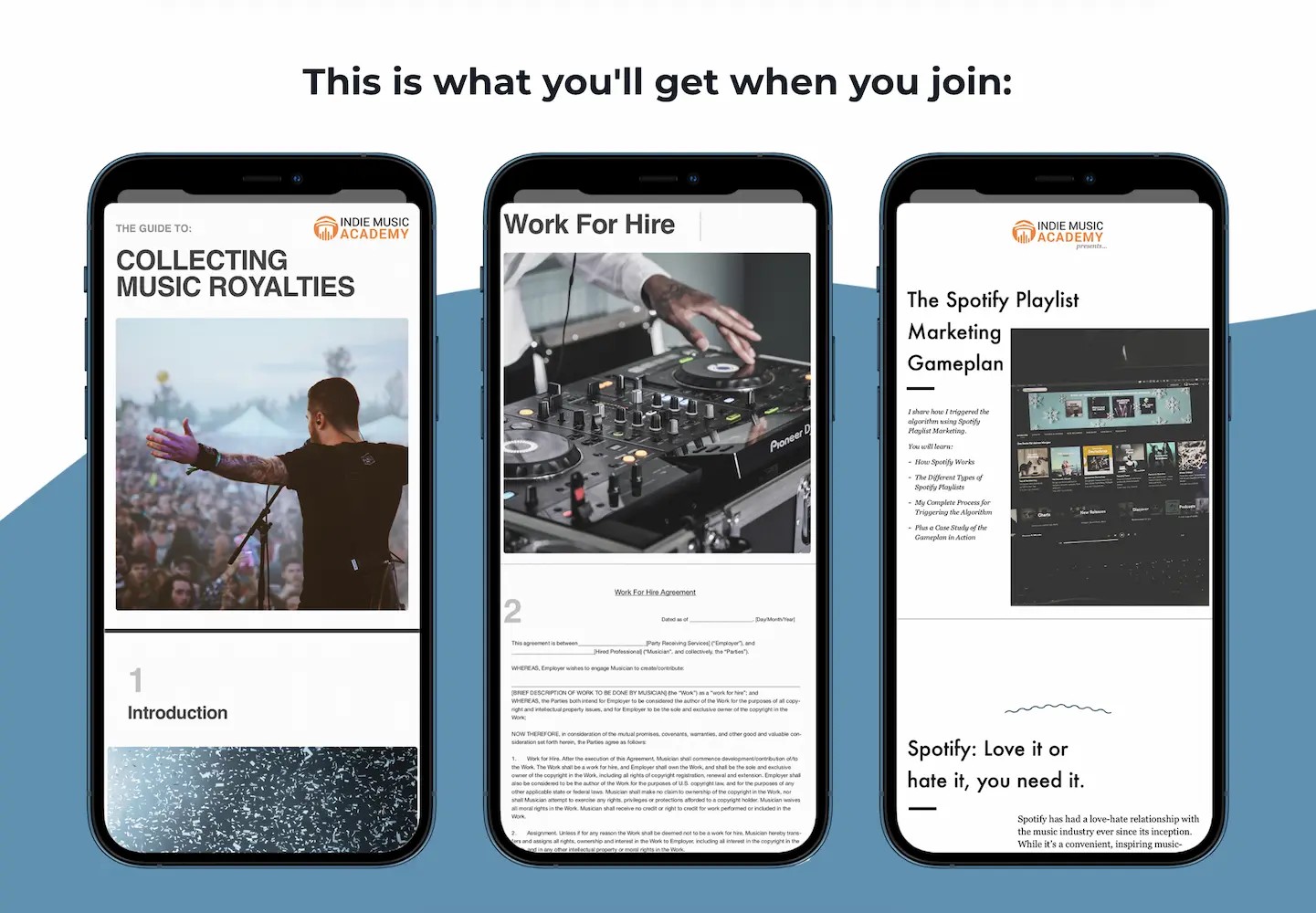Top 10 Coolest Jobs in the Music Industry

It's not just about the voice talent or the talented fingers on an instrument when it comes to making your mark on the music industry. Some of the coolest parts of the trade aren't behind the mic or up on stage. They're behind the scenes, in the studio, or shaking hands with a big name over a signed contract. Whatever your dream might be, these are 10 of the most interesting jobs that you can have in the music business.

Music Producer
The record producer is the individual who oversees the entire music production of an artist’s creation, whether it’s one song or a whole album. You can even earn royalties working as a producer. While it won’t require a music degree, you have to become familiar with tracking, mixing, editing, mastering, and everything in-between. Bonus points - If you’re a songwriter or instrumentalist yourself, you’ll be able to assist a recording artist with the arrangements (or even songwriting!) and prove yourself even more valuable.
How to Get Started: The best way to learn the job, is simply to do the job. Find new artists or bands and offer to produce a single for them for free (or for a modest stipend, to familiarize yourself with market rates). Be honest about your level of experience, but make it a point that this is a win-win situation where you get to gain experience for your career in music production, and they walk away with a professional quality recording for pennies. You can also read our article on How To Get Clients As A Music Producer.
Music Journalist
If you love to write and have a passion for music, then a journalism track would be the best for you. While the world of music journalism can be competitive, there’s plenty of ways to voice your criticism or praise for music. Newspapers today still have an Arts or Culture section, and there are several well-known magazines and online publications that are centered in the industry. Journalists get to interview new and upcoming artists, veteran artists, or scandals that rock the music scene. Plus, there’s always the chance they get VIP access for concert reviews or to new material, so they can spread the word about what’s hot and what’s not.
How to Get Started: Apply for internships at reputable publications, like Rolling Stone or Billboard. As long as you have the drive, you can make it! Speaking of online publications, you can absolutely start your own blog as well. This way you have complete creative control over what you write.
BONUS: How I Managed to Become a Full-Time Musician
Songwriter
If you love writing music and lyrics, but just don’t have the singing voice to back it up, all is not lost! A songwriter can create hundreds of songs in their career, and make a killing without having to sing a note themselves. This avenue is pretty common in the industry and lots of famous artists you love get their material from songwriters, instead of writing it themselves. It doesn’t require any voice talent, just an artistic drive and a creative flow that will capture an artist or producer’s attention. Songwriters also make a profit from selling their songs through royalties.
How to Get Started: No special connections or four-year college degree required. Just start writing! As you start building a portfolio, offer to help fellow artists with their music or make connections with recording studios in your area. Even if you don’t have the most stellar singing voice, you can grab more attention for the song if you record samples for distribution.

Mixing Engineer
A mixing engineer is someone who takes unmixed recordings from an artist and mixes the song in their preferred DAW (Digital Audio Workstation). Pro Tools by Avid is the most popular option and is largely considered the industry standard. Pro Tools is a digital soundboard for artists to mix and build their songs from scratch. Through this unique tool, it’s becoming a lot simpler for artists and bands to achieve professional-quality recordings from home. But in spite of this technology, music mixing is still best handled by a seasoned professional, and you can become one with a little practice and an easy certification process.
How to Get Started: Pro Tools Certification is available from the publisher Avid Learning Partner, but isn’t required by most clients to start mixing for them. Once you’re confident with the program, start mixing your own tunes or enlisting artist friends to style their mixes to build a portfolio.
Booking Agent
When an artist or band is planning an appearance or coordinating a whole tour, a booking agent is one of the most important individuals on that team. An artist manager can’t always handle the whole pie themselves, and that’s why a booking agent is so important when coordinating these events. They’re responsible for reaching out to venue owners, scheduling the dates (especially if it’s a multi-stop tour), times, number of personnel needed, security, and much more. It’s a full-time responsibility and booking agents have proven their value time and again.
How to Get Started: While a college degree isn’t required to get started, it helps to have some sort of connection to the music industry. Whether that be musician friends, or befriending the owner of a local venue, aspiring booking agents can dip their toes into the field slowly and work from there. Simply ascertain what an artist would need for their performance and research which venues will deliver. To learn more about booking a tour, check out our article on How to Book a Tour.
Music Teacher
Spreading the art-form in schools and communities can be just as fulfilling as the fame and fortune side of things. By becoming a music teacher, you’ll help guide bright-eyed newcomers on the best ways to perfect their sound. If you took music lessons when you were young and are familiar with what’s expected from your students, this could be an ideal career in music for you.
How to Get Started: One way to become a private music teacher is to reach out to your local community and seek out students for private lessons. It could be difficult if you don’t have some sort of reputation or resume attached, but you would be able to make your own hours and be a self-starter. Alternatively, you could apply for a job at a reputable children's music academy or after school program. You would typically be paid an hourly rate, but you're guaranteed a steady supply of students. Additionally, being skilled in multiple instruments will give you an advantage.

Music Festival Organizer
Do you love attending music festivals and always wondered how you could improve them? Then becoming a festival organizer or event manager might be a great path. Like any major event, there are tons of planning that goes into a successful festival (and prevent it from becoming the next Fyre Festival!). There’s booking the artists, marketing the weekend, coordinating food, drinks, and sanitation, and so much more. But one of the perks is obviously being able to enjoy the fruits of your labor for free! It’s a largely logistical career with a focus on business operations, with the added bonus of helping artists expand their fanbase in the music industry.
How to Get Started: There’s no one way to get involved with a music festival, but you can always start by volunteering, or just asking! Check out festival websites and look up career opportunities, or ask how you can help put on a great show. With dynamic events like these, they often need as many hands helping as possible.
Artist Manager
Artist management is the backbone of the artist’s career! Like the Chief of Staff in the White House, the artist manager is in charge of the day-to-day planning and implementation of anything career-related. They help the artist with choosing shows, releasing new albums, planning tours, and generally steering their career in the direction they want to go. Since they're so involved in the process of making an artist's career, they can earn royalties on their client's music. All it takes to be a successful manager is top-notch communication skills and connections, rather than a fancy four-year degree. You’ll also need the personality to work well with other artists and their managers, since these are the people you’ll be running into on an almost daily basis.
How to Get Started: Don’t rush into landing a manager job for ten clients at once, but instead start small and build as you go. Ask if any musician friends need help with business administration, like booking gigs, coordinating collaborations, or running their social media. Start with one or two artists that you get along with and believe in their vision, and build your portfolio from there.
Radio DJ
You don’t need any prior music experience at all to still appreciate the art-form! Despite how prevalent that podcasting and online streaming have become, radio stations are still just as important for breaking out new artists and keeping local interest alive. If you have the right personality and voice, a radio DJ could be the perfect calling for your outgoing personality. Radio DJs are the ones who introduce new music, interview music artists when they’re in town for shows, and keep people sane on their commutes home from work.
How to Get Started: The best way to start your Radio DJ path is to get into the radio station as soon as possible. Whether that’s through your college radio station, or as an intern at a local station, get in the door as quickly as possible and prove your metal.
A&R Coordinator
A&R stands for Artists & Repertoire, and is basically the talent scout or headhunter division of record companies. They’re responsible for seeking out new talent that would fit into the record label’s roster of stars. This Coordinator is probably one of the most networked individuals in the industry, as it requires hard work and hustle.
How to Get Started: Now, this is one music career where a college degree would benefit. Many employers would be looking for someone with a Communications-type degree, or Business and Marketing. Another important tip is that prospective A&R Coordinators shouldn’t wait for experience to show up to them, but rather build their own experience by making opportunities happen.
If you want to learn more about how the music industry works, check out our free resources inside the Indie Vault:






